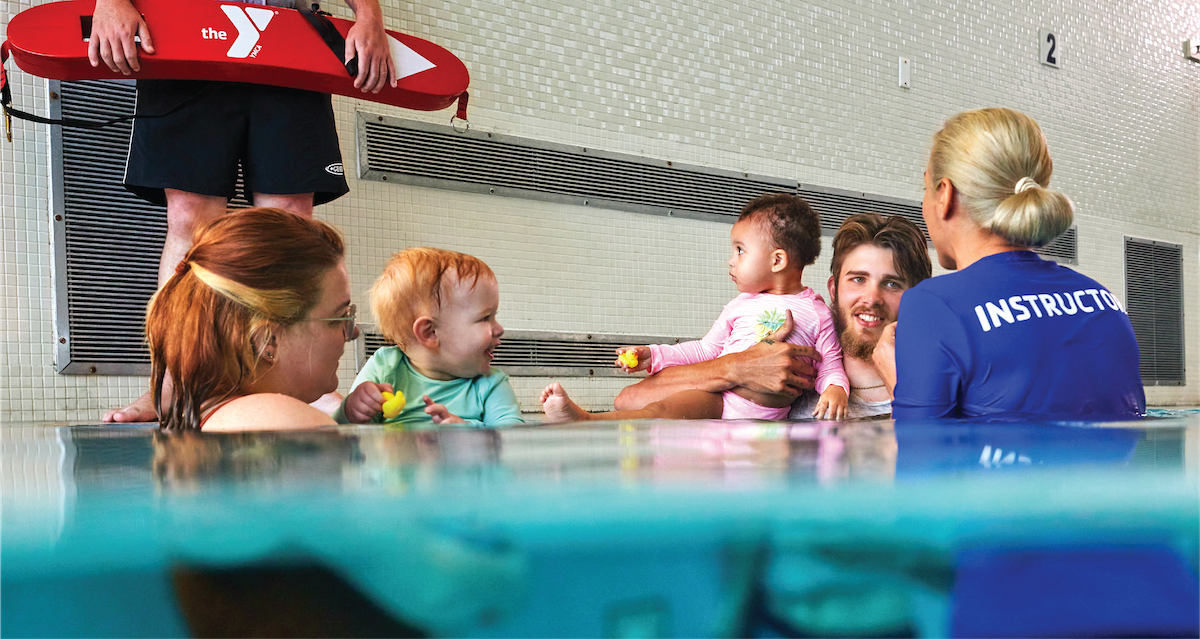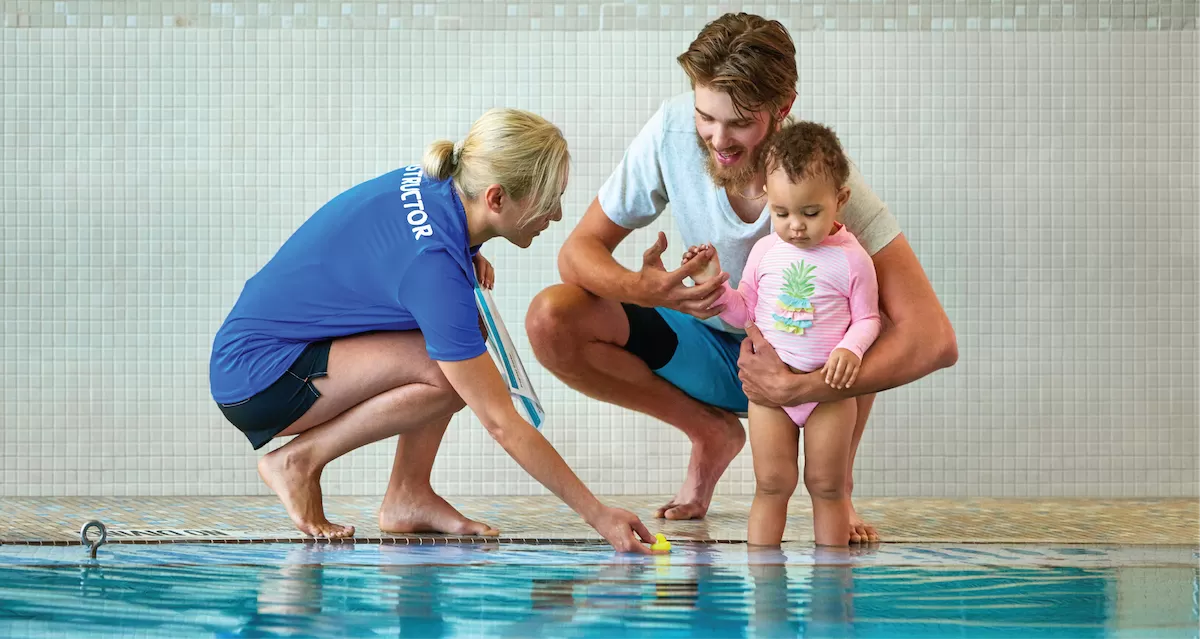
In the United States, swimming is the most popular recreational activity for children and teenagers and the fourth most popular recreational activity overall. It's also a form of exercise, which is great for heart health and combating childhood obesity. Experts suggest that swimming is even excellent for your mental health. Swimming is also one of life's most essential skills: the ability to swim can help save your life or someone else's life, while introducing you to a lifetime of healthy, enjoyable activity in the water.
Swimming is undoubtedly good for you — but at what age do you start swim lessons? Read on to learn why teaching your child how to swim at an early age is essential, as well as tips for fostering a fun and safe learning experience.
The Best Age to Start Swim Lessons
Studies show that the best time for a child to start learning swim basics is between the ages of 1 and 4. However, infants aged 6 months to 3 years can participate in Parent and Child Lessons at the Y to start enjoying and getting acclimated to the water. These lessons also teach parents crucial water safety skills to better educate and protect your child. If your child is older than 4, don't worry. It's never too late to learn. Ages 4 and up are when kids begin to grasp the techniques of swimming, like floating and swimming to a specific destination.
Enrolling your child in swim lessons between the ages of 6 months and 4 years is the most effective way to help them acclimate to water. This early acclimation will encourage them not to fear swimming as their lessons get more challenging.
Benefits of Learning to Swim at a Young Age
Learning to swim at a young age can be very beneficial for your child's mental and physical development, help keep them safe and build lifelong skills.
These are just a few advantages of teaching your child how to swim early in life.
- It builds a robust foundation for a healthy lifestyle: Swimming keeps kids healthy and exercises key areas of their physical development, including lung and muscle health, flexibility and stamina.
- They'll know what to do if they fall in: Formal swim lessons will teach your child the necessary survival skills they need to stay safe around the water.
- It builds vital skills: In addition to your child's physical development, swim lessons allow your child to meet other kids their age and practice their social skills. Because they have a shared interest, they might even make some new friends!
- It's a break from screen time: Today, children are spending more time watching screens than ever before. Too much screen time often links to obesity, irregular sleep and behavioral problems. Experts recommend all children under 5 years old engage in less screen time to grow up healthier. Swimming is the ideal opportunity to introduce non-screen activities into your child's routine.
- It could encourage a new interest: When your child learns to swim at a young age, it will encourage them to pursue new things with confidence, and could even spark an interest in other water-related activities like professional swimming, kayaking, diving and more.
What If My Child Doesn't Like It?
If you have started to introduce your child to the pool or enrolled them in swim lessons, only to find they don't enjoy it, don't worry! You can take a few steps to make the experience more enjoyable for both of you, and encourage them to view swimming differently.
- Start at home: Before opting for a formal swim class or in between lessons, let your child get comfortable with water at home. Bathtime is the perfect opportunity to get them used to the idea of being submerged in the water. Show them how much fun they can have by blowing bubbles or making small splashes.
- Let them watch others swim: If your child is resisting swim lessons because they are afraid or unsure what to expect, let them watch you as you or other children around their same age enjoy the pool. You will help your child begin to see swimming as a fun activity rather than a lesson to learn or an obstacle to overcome.
- Make it fun: Don't let swimming lessons be a source of stress or worry for your child. Implement rewards, goals and activities to make it a fun and exciting time. Pool games are a great motivator and help your child learn how to float, kick and tread water without realizing it. You should also consider using a variety of toys and objects to make swim time more engaging, like pool noodles, goggles and snorkels.
- Establish a routine: Repetition is an essential part of learning any new skill. Incorporate regular swimming lessons into your child's weekly routine. Doing so will give them something to look forward to and provide a chance to continue developing their ability over time.
- Don't force it: If you've tried everything to encourage your child to enjoy swimming and nothing seems to work, it's best to let it go for now. It's possible that, in the future, they will become more curious and want to try again. In the meantime, there are several other ways to help your child stay active and develop social skills.
Tips for Safe Swim Lessons
While enrolling your child in formal swim lessons at a young age can be very beneficial to their social and physical development, it's ultimately your decision. You know what's best for your child. If you've decided to pursue lessons, that's great!
For a safe and enjoyable experience, keep these swimming safety tips in mind:
- Check that the water is at a comfortable temperature — not too hot and not too cold.
- Teach your child how to use flotation devices, including throw rings, so they know how to respond in an emergency.
- Enroll your child in formal swim lessons. Working one-on-one with your child is a good way to make them more comfortable with swimming, but lifeguards are trained professionals and equipped to handle lessons safely and effectively.
- Choose your child's swim lessons carefully. Classes should be small, focused and led by a certified instructor. Keep in mind that not every program is suitable for all children. If your child isn't enjoying or benefiting from swim lessons, search other local options.
- When your child is swimming outside their formal lessons, monitor them at all times. Know how to recognize signs of stress in the water and consider taking an emergency CPR class.
- If your child is just starting, practice in a supervised pool before moving on to more unpredictable bodies of water, like a lake or ocean.
Learn More About Swimming Lessons at the Y
With more than 110 years of experience teaching millions of people to swim, the Y is America's most trusted swim instructor. A trained, caring instructor leads every swimming lesson at a Gateway Region YMCA. Our teachers emphasize water safety skills and focus on conquering milestones based on your child's experience and progress. Lifeguards conduct lessons in private, semi-private or small class environments, so each child receives the level of attention and guidance they need. Plus, swim lesson participants receive mid-session and final progress reports through SwimGen to stay updated on their child's swim journey. If you prefer a more hands-on approach, you could also consider a parent-and-child swim lesson to create lasting memories together. If you find yourself overwhelmed with finding the right lesson for you or your child, we recommend you utilize our Swim Lesson Finder tool. Answer a few questions about your child's comfort and skill level with water, and receive an immediate recommendation on the right swimming lesson stage.
To learn more, visit us online or find a Y with swimming lessons near you!
